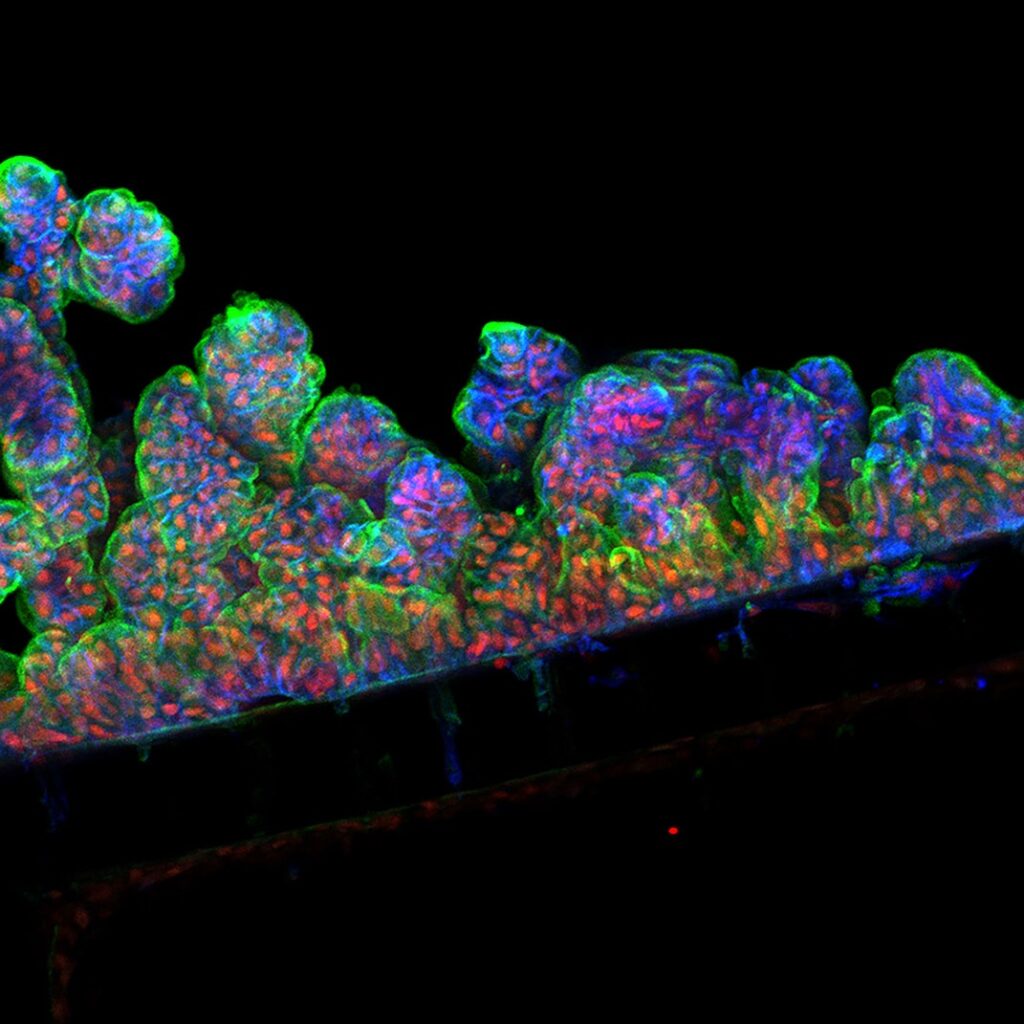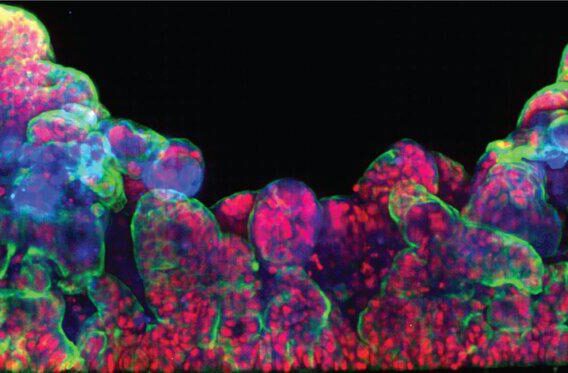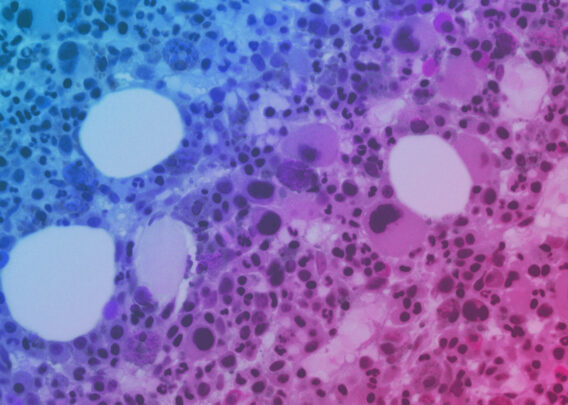Findings Have Potential to Advance Personalized Treatments for Gastrointestinal Diseases
LOS ANGELES, Calif. & BOSTON, Mass. — Investigators have demonstrated how cells of a human intestinal lining created outside an individual’s body mirror living tissue when placed inside microengineered Intestine-Chips, opening the door to personalized testing of drug treatments.
The findings have the potential to change how patients are treated for debilitating, inflammatory gastrointestinal diseases with a genetic component, such as Crohn’s disease, ulcerative colitis and irritable bowel syndrome.
Instead of exposing a patient to drug treatments that may be costly, ineffective or carry harmful side effects, scientists could use the individual’s own stem cells to produce a duplicate of the intestinal lining on an Intestine-Chip and test multiple drugs on it. Scientists then could determine which drug worked best on that patient’s intestine.
The study was conducted by investigators at the Cedars-Sinai Board of Governors Regenerative Medicine Institute and Emulate, Inc. in Boston.
This advance will allow biomedical scientists to study the functioning of an individual’s intestinal lining in a controlled microenvironment, where the lining can interact with immune cells, blood cells and drugs, said Robert Barrett, PhD, assistant professor of Medicine and research scientist at the Cedars-Sinai Board of Governors Regenerative Medicine Institute. Barrett is senior author of the study, published in Cellular and Molecular Gastroenterology and Hepatology, a journal of the American Gastroenterology Association.
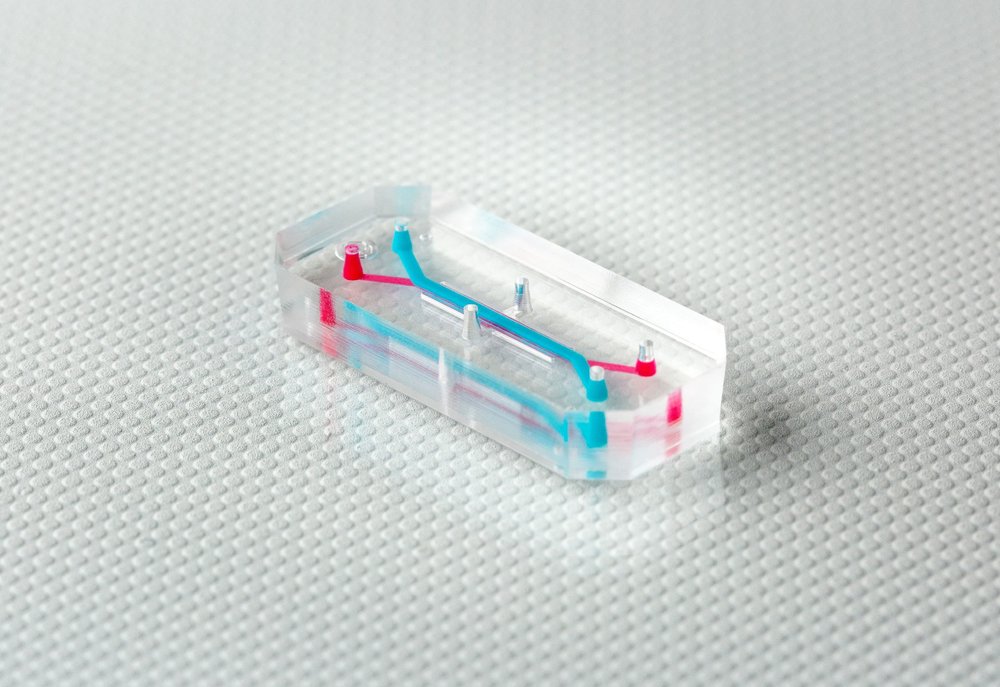
“This pairing of biology and engineering allows us to re-create an intestinal lining that matches that of a patient with a specific intestinal disease—without performing invasive surgery to obtain a tissue sample,” said Clive Svendsen, PhD, director of the Cedars-Sinai Board of Governors Regenerative Medicine Institute and a co-author of the study. “We can produce an unlimited number of copies of this tissue and use them to evaluate potential therapies. This is an important advance in personalized medicine.”
The study team used two advanced technologies to produce and sustain the intestinal lining: Cedars-Sinai provided the induced pluripotent stem cells, or iPSCs, while Emulate supplied its Intestine-Chip, which is made out of a flexible polymer that features tiny channels that can be lined with thousands of living human cells.
This pairing of biology and engineering allows us to re-create an intestinal lining that matches that of a patient with a specific intestinal disease—without performing invasive surgery to obtain a tissue sample. We can produce an unlimited number of copies of this tissue and use them to evaluate potential therapies. This is an important advance in personalized medicine.
— Clive Svendsen, PhD, director of the Cedars-Sinai Board of Governors Regenerative Medicine Institute
To make the iPSCs, Cedars-Sinai investigators first took small samples of blood and skin cells from an adult. They reprogrammed these cells into iPSCs, which are similar to embryonic stem cells and can produce any type of body cell. Using special proteins and other substances, the scientists prodded the iPSCs to produce cells of the intestinal lining. Each cell bore the unique genetic fingerprint and characteristics of the adult who donated the original cells. The new cells were used to grow miniature versions of the person’s intestine lining, known as organoids.
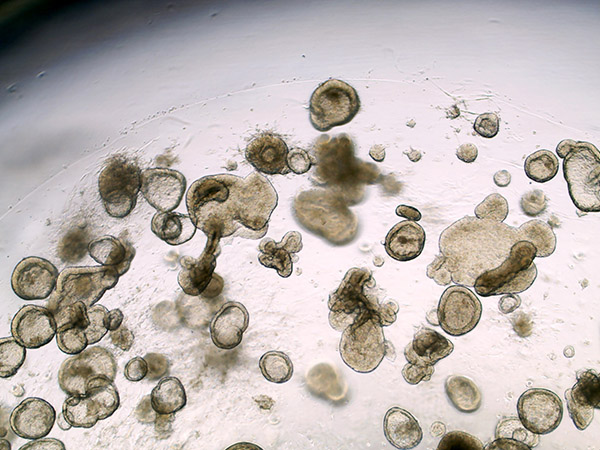
To read and download the publication, see Enhanced Utilization of Induced Pluripotent Stem Cell–Derived Human Intestinal Organoids Using Microengineered Chips.
The team then selected cells from these organoids and placed them inside the Intestine-Chips, which are about the size of AA batteries and re-create the natural microenvironment of the human intestine, including the intestinal epithelium—the layer of cells that forms the lining of both the small and large intestines. Fluids were passed through microchannels of these chips, creating an environment that enabled the cells to develop the 3-D villi-like structures as found in the intestine in the body. Tests showed that the intestinal lining the researchers formed contained all the key cell types normally found in such a tissue.
“Organ-Chips address major challenges in studying the human intestine and intestinal diseases in the lab,” said Geraldine A. Hamilton, PhD, president and chief scientific officer of Emulate and a co-author of the study. “The Intestine-Chip is a ‘home-away-from-home’ for human cells, and provides them with the right microenvironment and biological cues they need to behave just like they do in the body. Our Intestine-Chip also allows researchers to culture intestinal epithelial cells alongside other cell types, such as immune cells, and analyze how these different cell types interact.
“Further, by partnering with Cedars-Sinai to generate intestinal linings from iPSCs, we can match the Intestine-Chip to individual donors,” Hamilton added.
The study was part of an initiative of Cedars-Sinai Precision Health, whose goal is to drive the development of the newest technology and best research, coupled with the finest clinical practice, to rapidly enable a new era of personalized health.
About Cedars-Sinai
Cedars-Sinai is a national leader in providing high-quality, patient-centered healthcare encompassing primary care as well as specialized medicine and conducting research that leads to lifesaving discoveries and innovations. Since its beginning in 1902, Cedars-Sinai has evolved to meet the healthcare needs of one of the most diverse regions in the nation, continually setting new standards in quality and innovation in patient care, research, teaching and community service. Today, Cedars-Sinai is widely known for its national leadership in transforming healthcare for the benefit of patients. Cedars-Sinai impacts the future of healthcare globally by developing new approaches to treatment and educating tomorrow’s physicians and other health professionals. At the same time, Cedars-Sinai demonstrates a longstanding commitment to strengthening the Los Angeles community through wide-ranging programs that improve the health of its most vulnerable residents.
About Emulate, Inc.
Emulate, Inc. is a privately held company that creates living products for understanding how diseases, medicines, chemicals, and foods affect human health. Our Human Emulation System™ sets a new standard for re-creating true-to-life human biology and is being used to advance product innovation, design, and safety across a range of applications including drug development, agriculture, cosmetics, food, and chemical-based consumer products. Emulate continues to develop a wide range of Organ-Chips and disease models through collaborations with industry partners and internal R&D programs. Emulate is also working with clinical partners to produce Organ-Chips personalized with an individual patient’s stem cells, for applications in precision medicine and personalized health. Our founding team pioneered the Organs-on-Chips technology at the Wyss Institute for Biologically Inspired Engineering at Harvard University. Emulate holds the worldwide exclusive license from Harvard University to a robust and broad intellectual property portfolio for the Organs-on-Chips technology and related systems.
Disclosure
Cedars-Sinai owns a minority stock interest in Emulate, Inc. An officer of Cedars-Sinai also serves on Emulate’s board of directors. Emulate provides no financial support for this research.
Funding
Research reported in this news release was supported by the National Institute of Diabetes and Digestive and Kidney Diseases of the National Institutes of Health under award number R56DK106202-01, the Cedars-Sinai Board of Governors Regenerative Medicine Institute, the Cedars-Sinai F. Widjaja Foundation Inflammatory Bowel and Immunobiology Research Institute and the Drown Foundation.
Image 1 caption:
Cells of a human intestinal lining, after being placed in an Intestine-Chip, form intestinal folds as they do in the human body.
Image credit: Cedars-Sinai Board of Governors Regenerative Medicine Institute
Image 2 caption:
Microengineered Organ-Chip is made out of a flexible polymer that features tiny channels that can be lined with thousands of living human cells.
Image credit: Emulate, Inc.
Image 3 caption:
These miniature versions of a human intestinal lining, known as organoids, were generated using the science of induced pluripotent stem cells, or iPSCs, at Cedars-Sinai. Each cell of the organoids bore the unique genetic fingerprint and characteristics of an individual.
Image credit: Cedars-Sinai Board of Governors Regenerative Medicine Institute

